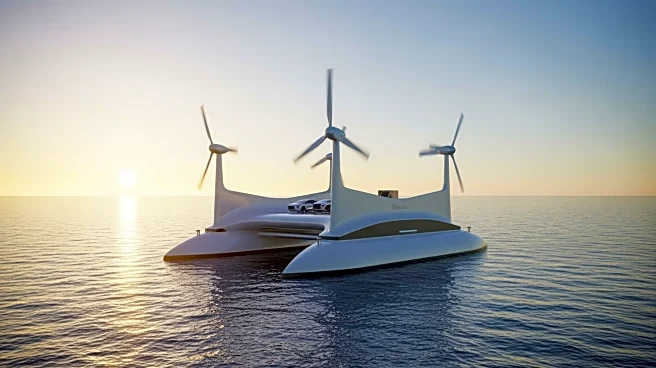What's Happening?
The American Bureau of Shipping (ABS) has granted an approval in principle (AIP) to Encomara for its innovative Squid system, which is designed to enhance floating offshore wind projects. The Squid system utilizes the Disconnectable Turret Buoy (DTB) concept, a technology traditionally used in floating production projects, to improve safety and reduce complexity during the installation and operation of floating wind turbines. Encomara's Managing Director, Ian Donald, highlighted the system's potential to significantly improve efficiency and project scheduling for offshore turbine operators. The approval from ABS confirms that the Squid system meets international offshore standards, marking a significant step in advancing the deployment of offshore wind turbines.
Why It's Important?
The approval of Encomara's Squid system by ABS is a crucial development in the renewable energy sector, particularly for offshore wind projects. By repurposing proven technology from the oil and gas industry, the Squid system aims to facilitate the faster and safer installation of floating wind turbines, which could accelerate the transition to renewable energy sources. This innovation is expected to enhance the efficiency of offshore wind projects, potentially reducing costs and improving project timelines. The certification by ABS underscores the system's compliance with international standards, which is vital for gaining trust and investment in the renewable energy market.
What's Next?
With the approval in principle from ABS, Encomara is poised to further develop and deploy the Squid system in upcoming offshore wind projects. The next steps will likely involve detailed engineering and testing phases to ensure the system's reliability and performance in real-world conditions. Stakeholders in the renewable energy sector, including turbine operators and investors, will be closely monitoring the progress of the Squid system as it moves towards commercial deployment. The successful implementation of this technology could lead to broader adoption in the industry, driving further innovation and investment in floating offshore wind solutions.
Beyond the Headlines
The development of the Squid system represents a broader trend of leveraging existing technologies from the oil and gas sector to support renewable energy initiatives. This approach not only reduces the learning curve for new technologies but also capitalizes on decades of engineering expertise. The successful adaptation of such technologies could pave the way for more sustainable practices in energy production, contributing to global efforts to combat climate change. Additionally, the focus on safety and efficiency in offshore wind projects highlights the industry's commitment to minimizing environmental impact while maximizing energy output.

















